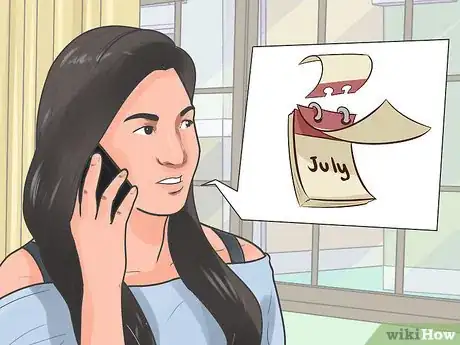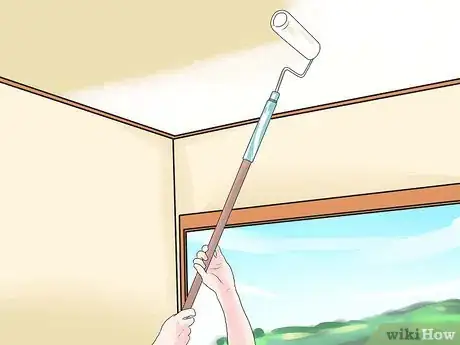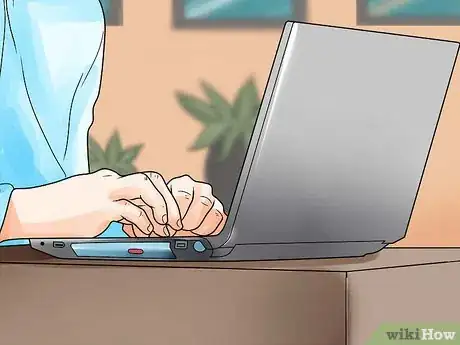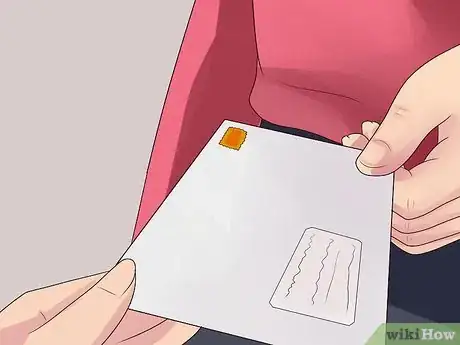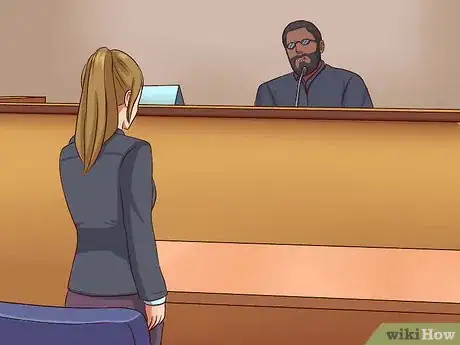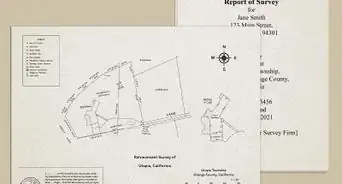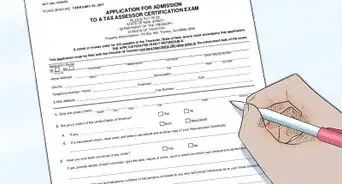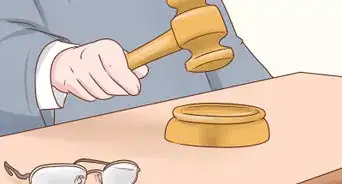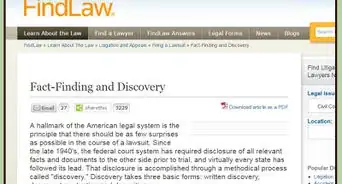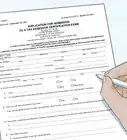This article was co-authored by Clinton M. Sandvick, JD, PhD. Clinton M. Sandvick worked as a civil litigator in California for over 7 years. He received his JD from the University of Wisconsin-Madison in 1998 and his PhD in American History from the University of Oregon in 2013.
There are 10 references cited in this article, which can be found at the bottom of the page.
This article has been viewed 26,866 times.
You can squat in abandoned property if you need temporary shelter or if you want a permanent place to stay. You can also get legal title to the abandoned property, depending on the circumstances. The process of gaining title by squatting is called “adverse possession” or “acquisitive prescription.” In Louisiana, you can gain title to abandoned property in limited circumstances.
Steps
Finding a Place to Squat
-
1Identify abandoned property. You can’t squat on property that is currently being occupied. If you do, you run a high risk of being arrested or facing direct violence from the current occupants. Accordingly, you should scope out property that you want to squat on.
- Common signs that property has been abandoned include boarded-over windows and barred doors. Also, a building is likely to be abandoned if it looks in disrepair.[1]
- Be sure to visit the property at different times of day to make sure that someone isn’t living there. Sometimes, people work at night but will be home during the day.
-
2Check the safety of the property. Abandoned property can often be unsafe. For example, rotting floorboards, stairs, and banisters pose a health risk. Also, abandoned property may be infested with vermin, like mice or rats. For this reason, you should check the property before moving in. Always remember to knock before entering.[2]
- You should walk through the property and check the sturdiness of the building.
- You can also squat on abandoned real estate, such as a field. You still should check to see if the land is safe. There may be obscured holes or ditches in the ground.
Advertisement -
3Find out the owner of the property. Only the owner can evict you, so you should find out the identity of this person. In Louisiana, land records are kept by the court clerk of a parish, which should have a Land Records office.[3] You should stop in and find out the identity of the owner. Remember to take the address of the abandoned property with you.
-
4Secure the property. Your safety should always be most important. Accordingly, you should change the locks to the house and fix any broken windows or doors.[4] You want the building to be secure, particularly when you sleep at night.
- If you have identified an abandoned property to squat on, then you can be sure other squatters will eventually find it as well. Some squatters suffer from mental illness or substance abuse, and they may act violently. You can protect yourself by securing all entrances to the building.
-
5Turn on gas and electricity. You should make the home as comfortable as possible. If the water and electricity have not been turned off, then you can use them. However, you should still contact the water and electricity companies to have the accounts put in your name.
- If you don’t change the name of the account, then the bills could be sent to the real owner. This can tip them off that someone is on the property.
-
6Realize you may be arrested. Squatting is not for everyone. It is illegal under Louisiana law to trespass on someone’s property, and the owner can return to evict you at any time.[5] Of course, the owner will have to go through the legal process to evict you, which isn’t easy. Nevertheless, a committed land owner will get you evicted.
- If you don’t want to be arrested, then you either shouldn’t squat or you should only squat with other people who have occupied an abandoned property for a number of years. The longer a property has been abandoned, the less likely that the owner will return.
Satisfying the Requirements for Adverse Possession
-
1Check if you have “just title.” Sometimes, people buy property but the sale is defective. For example, the deed used to transfer the property might have described the land inaccurately, or the person transferring the land never had rights in the property to transfer. If you honestly believed that you received the title from the real owner, then you probably have “just title.”[6]
- In Louisiana, the amount of time you need to occupy the land is shorter if you took possession under just title and in good faith.[7]
-
2Physically occupy the land. You won’t be able to get title to the abandoned property unless you actually physically possess it.[8] For example, you can’t see an abandoned home and think, “Hmm, I’d like to adversely possess that land someday.”
- Adverse possession exists because the law wants people to put land to use instead of allowing it to go to waste.[9] Accordingly, you need to actually be on the property physically.
-
3Possess the property exclusively. In order to qualify for adverse possession, you must occupy the land exclusively.[10] This means that you can’t share the property with anyone else.
-
4Occupy the land continuously. Another requirement for adverse possession is that you must occupy the land for a certain amount of time.[11] The amount of time will depend on whether or not you took just title.
- If you took just title, then you must occupy the abandoned property for 10 continuous years.
- If you didn’t take just title, then you must occupy the property for 30 continuous years.
-
5Make improvements to the property. You need to treat the property as if it is your own. In fact, the law requires that you possess the land in an “open and notorious” manner.[12] All this means is that you can’t be hiding in the property. Instead, it should be apparent from the outside that someone is living there.
- The easiest way to occupy abandoned property in an open manner is to make improvements to it. If you want to use abandoned land, then you can install fencing.
- You can also fix the windows and paint an abandoned building.
-
6Occupy the property peaceably. You might not be able to claim adverse possession if the police are called out frequently to the property.[13] To protect your rights, you should be as low-key and peaceful as possible.
- Don’t get into arguments with your neighbors. Although your neighbors can’t evict you, they can call the police. The police might then take it upon themselves to try and evict you, even if it is illegal for them to do so.
Obtaining Title to the Property
-
1Meet with a lawyer. Once you have satisfied the requirements for adverse possession, you can become the legal owner by bringing an action to “quiet title.” This means you ask a judge to decide, once and for all, that you are the legal owner of the land. If you want to bring a quiet title action, then meet with a lawyer to discuss your options.[14]
- You can get a referral to a Louisiana real estate lawyer by calling a lawyer referral number. The numbers are available on the Louisiana Bar Association website here: https://www.lsba.org/Public/LawyerReferral.aspx.
- Because quiet title actions are complicated, you should think seriously about hiring the lawyer to represent you. Ask how much they charge.
-
2Draft a petition to quiet title. This document will identify the property and explain why you qualify for adverse possession. You should work closely with your lawyer so that they have all of the necessary information about how long you have possessed the land and whether you possessed it in an open and notorious manner.
-
3File your petition. You should make several copies of your petition and take them, along with the original, to the district court in the county where the property is located. Ask the court clerk to file your petition. The clerk can also stamp your copies with the date.
- You will probably have to pay a filing fee. If you can’t afford the fee, then ask for a fee waiver form. You might qualify for a fee waiver if you receive public assistance or if your income is 125% of the federal poverty line or less.[15]
-
4Serve notice of the lawsuit. You have to give anyone with an interest in the property a chance to fight your petition to quiet title. This will mean giving them notice, which consists of a copy of your petition and other papers. Depending on your situation, you may have to give notice to everyone listed on a title report.
-
5Attend a court hearing. The judge won’t give you title by adverse possession without a hearing. At the hearing, your lawyer can explain why you are entitled to title. If the judge agrees, then they will sign a judgment in your favor.
- If the owner of the property shows up to fight your attempt to get the title, then the judge might need to schedule a trial on the issues. You should work with your attorney to gather evidence that shows you have satisfied all of the requirements of adverse possession.
References
- ↑ http://www.archiv.squat.net/squatbook1/index.html
- ↑ http://www.archiv.squat.net/squatbook1/index.html
- ↑ http://www.orleanscivilclerk.com/lr_home.html
- ↑ http://www.archiv.squat.net/squatbook1/index.html
- ↑ http://law.justia.com/codes/louisiana/2006/146/78584.html
- ↑ http://definitions.uslegal.com/j/just-title%20/
- ↑ http://www.nolo.com/legal-encyclopedia/state-state-rules-adverse-possession.html
- ↑ http://statelaws.findlaw.com/louisiana-law/louisiana-adverse-possession-laws.html
- ↑ http://www.legalmatch.com/law-library/article/adverse-possession-lawyers.html
- ↑ http://statelaws.findlaw.com/louisiana-law/louisiana-adverse-possession-laws.html
- ↑ http://statelaws.findlaw.com/louisiana-law/louisiana-adverse-possession-laws.html
- ↑ http://statelaws.findlaw.com/louisiana-law/louisiana-adverse-possession-laws.html
- ↑ http://www.landlordstation.com/blog/what-are-squatters-rights-in-louisiana/
- ↑ http://statelaws.findlaw.com/louisiana-law/louisiana-adverse-possession-laws.html
- ↑ http://louisianalawhelp.org/resource/in-forma-pauperis-when-you-cant-afford-court?ref=TF1Db









